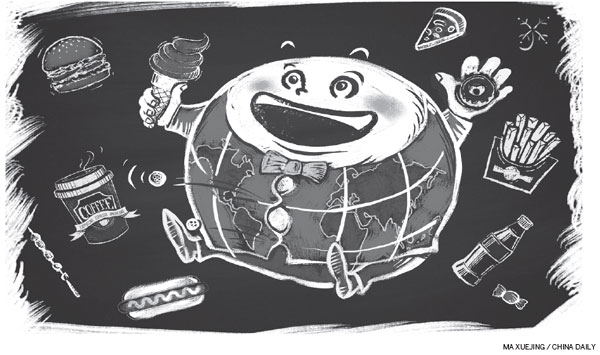Obesity poses big threat to world
Updated: 2015-04-14 08:03
By Richard Dobbs and Boyd Swinburn(China Daily)
|
||||||||
Today, more than 2.1 billion people - nearly 30 percent of the global population - are overweight or obese. That is nearly two and a half times the number of adults and children who are undernourished. Obesity is responsible for about 5 percent of deaths worldwide.
This crisis is not just a pressing health concern; it is also a threat to the global economy. The total economic impact of obesity is about $2 trillion a year, or 2.8 percent of world GDP - roughly equivalent to the economic damage caused by smoking or armed violence, war and terrorism, according to a new research by McKinsey Global Institute.
And the problem is likely to worsen. If the current trend continues, almost half of the world's adult population will be overweight or obese by 2030.
This global epidemic is not confined to advanced countries. As emerging economies climb out of poverty, people there are becoming fatter. More than 60 percent of the world's obese people live in developing countries, where rapid industrialization and urbanization are boosting incomes and therefore calorie intake. In India and China, the prevalence of obesity in cities is 3-4 times the rate in rural areas.
Indeed, the evidence suggests that developing countries are especially vulnerable to the epidemic. Obesity rates tend to explode in countries where food was once scarce and suddenly became plentiful.
To make matters worse, in countries with limited public healthcare services, the cost of healthcare falls directly on the afflicted households. As a result, obesity can lock in poverty and perpetuate inequality.
Through a review of 500 intervention trials around the world, MGI has identified 74 potential interventions that could be used to address obesity. These include subsidized school meals, urban design that encourages walking, better nutritional labeling, restrictions on the advertising of high calorie food and drinks, and fiscal measures.
Education on obesity risks is important, as is taking personal responsibility for one's health, fitness and weight. But all the evidence show that relying on knowledge about obesity and willpower is not enough to offset the evolutionary instinct to overeat. These effects are compounded by lifestyles that require little or no physical activity.
MGI was able to collect enough data on 44 of the 74 potential interventions to develop an initial assessment of their impact if they were scaled up to a national level. If the United Kingdom, for example, were to deploy all 44 interventions, it could rein in obesity rates and help roughly 20 percent of its overweight and obese population return to a healthy weight in 5 to 10 years.
Over the long term, savings from reduced healthcare spending and gains from higher productivity could outweigh the investment needed to deliver interventions.
For many countries, tackling obesity will require a national - if not global - effort. Only a coherent, sustained portfolio of initiatives, implemented on a large scale, will be effective. No single entity - government, retailers, consumer goods companies, restaurants, employers, media organizations, educators, healthcare providers or individuals - can address obesity on its own.
We do not yet have all the answers when it comes to the best way to tackle obesity. But the rapid rise in obesity rates around the world creates a strong case for experimenting with interventions, to see what works. Today, investment in obesity research worldwide amounts to some $4 billion a year - just 0.2 percent of the estimated social costs of obesity. We can - and must - do more.
Richard Dobbs is a director of McKinsey & Company and of the McKinsey Global Institute, and Boyd Swinburn is professor of Population Nutrition and Global Health at the University of Auckland and director of the World Health Organization Collaborating Center for Obesity Prevention at Deakin University in Melbourne.
Project Syndicate

(China Daily USA 04/14/2015 page12)

 Ex-student sought in shooting death of North Carolina college
Ex-student sought in shooting death of North Carolina college
 Women in politics - Hillary Clinton is just one of them
Women in politics - Hillary Clinton is just one of them
 10 Red Dot Award winning carmakers in '14
10 Red Dot Award winning carmakers in '14
 Get a birthday cake for your pets
Get a birthday cake for your pets
 7 ways to beat 'spring sleepiness'
7 ways to beat 'spring sleepiness'
 Legendary painting of Mona Lisa recreated
Legendary painting of Mona Lisa recreated
 National festival underway with cherry blossoms in peak bloom
National festival underway with cherry blossoms in peak bloom
 Ten photos you don't wanna miss - April 13
Ten photos you don't wanna miss - April 13
Most Viewed
Editor's Picks

|

|

|

|

|

|
Today's Top News
US to help smart
cities quest
Clinton's win not guaranteed despite global celebrity
US has record number of applications for H-1B tech visas
China's slow down has upside
US voluntary medical team funded for China trip
Hilary Clinton launches
presidential campaign
'No room' for election China-bashing: US politicians
AVIC buys Calif. aviation parts distributor
US Weekly

|

|





